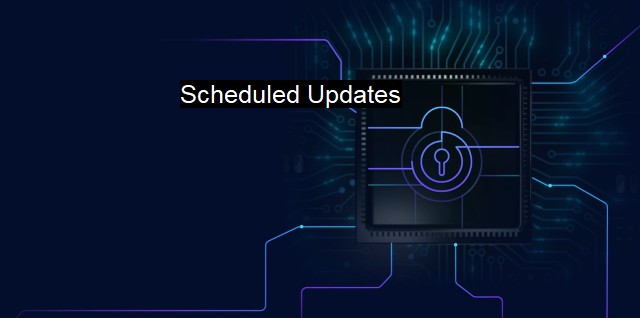What are Scheduled Updates?
Importance of Scheduled Updates in Cybersecurity and Antivirus Software: A Comprehensive Guide
Scheduled updates in the context of cybersecurity and antivirus programs refers to the predetermined and automated routine where software solutions actively seek out, download, and install the most recent updates or patches available from the software publisher. These updates are crucial in maintaining robust security measures and procedures in both personal computing systems and business-related infrastructures in order to protect against malicious activities of hackers, malware, and viruses.Updates in cybersecurity software and antivirus often address a range of diverse aspects related to their functionalities. They may include fixes for any known bugs or glitches, patches for security issues or vulnerabilities, improvements to software efficiency, or implement new features. An update strengthens the defences and improves overall performance, ensuring the system is equipped to tackle the latest threats actively circulating on the internet.
These updates are necessary to protect against 'Zero-day attacks.' These attacks refer to the exploitation of a security vulnerability before the software creator or administrator becomes aware of it or has a chance to fix it. In such scenarios, the vulnerabilities are taken advantage of on the 'Zeroth' or same day they are discovered. This makes scheduled updates within cybersecurity and antivirus tools especially important to mitigate these risks.
One of the most significant advantages of scheduled updates is their automation. Time is of the essence where cybersecurity is concerned: the sooner the available updates are installed, the smaller the window of opportunity for a potential cyber attack. In many cybersecurity situations, end-users are typically not tech-savvy persons having comprehensive knowledge and awareness about the nuances of security patches or versions updates. The system runs the scheduled updates in the background without the need for manual execution by the user, thus readily ensuring the system is secure and up-to-date without disrupting the user's tasks.
Scheduled updates are not free from potential drawbacks. The primary concern being the possible introduction of new bugs or errors with the rollout of updates. Rebooting is another issue. Security updates often require systems to be rebooted—a significant inconvenience in organizational set-ups causing potential downtime. most top-of-the-line software solutions offer users the flexibility to schedule these updates during non-working hours or at times when their impact on workflow would be minimal.
In the ever-dynamic and evolving landscape of cybersecurity threats, the role scheduled updates play is non-negotiable. Keeping software updated may seem like a bane for several users, yet it serves as the cornerstone of sound cybersecurity protection strategy, fundamentally necessary for resilient, long-term protection against digital threats. Without fresh and scheduled updates to these programs, end-users render themselves vulnerable to data theft, sabotage, and exploitation.
Just as it is unwise to neglect annual health check-ups due to perceived good health, so is it dangerous to ignore frequent updating of cybersecurity software on the premise that systems seem to work just fine at the moment. Grappling with the side-effects of potential malware or cyber threats post-destruction is far more crippling than preventing attacks in the first place. Therefore, in carving effective responses towards a world highly connected and, in turn, increasingly vulnerable to surreptitious digital threats, scheduled updates of cybersecurity and antivirus tools stand as a time-tested and trusted measure.
Scheduled updates streamline the process of strengthening and reinforcing the defences of an operating system, ensuring it is frequently updated to counter the latest viruses and malware threats. As such, they represent an indispensable aspect of an effective cybersecurity strategy. Despite the potential inconveniences brought by the introduction of new bugs or system reboots, they still outweigh any potential disadvantages they have; making robust, scheduled, and regular updates a necessary habit for the safe upkeep of all digital devices.

Scheduled Updates FAQs
What are scheduled updates in the context of cybersecurity?
Scheduled updates in cybersecurity refer to regular updates or patches that are released by antivirus software providers to fix known security vulnerabilities in their products. These updates are meant to keep the antivirus software up-to-date and provide better protection against new and emerging threats.Why are scheduled updates important for antivirus software?
Scheduled updates are important for antivirus software because they help to ensure that the software is always equipped to deal with the latest threats. Cybercriminals are constantly developing new malware and viruses, so it is critical for antivirus providers to release regular updates to keep their software effective.How often should I expect scheduled updates for my antivirus software?
The frequency of scheduled updates for antivirus software varies depending on the provider. Some providers release updates daily, while others release them weekly or monthly. It is important to make sure that your antivirus software is set up to receive automatic updates so that you always have the latest protection.What should I do if I miss a scheduled update for my antivirus software?
If you miss a scheduled update for your antivirus software, it is important to manually check for updates as soon as possible. The longer you go without updating your software, the more vulnerable you become to new threats. Most antivirus providers have a manual update option within the software that you can use to check for and install any missed updates.| | A | | | B | | | C | | | D | | | E | | | F | | | G | | | H | | | I | | | J | | | K | | | L | | | M | |
| | N | | | O | | | P | | | Q | | | R | | | S | | | T | | | U | | | V | | | W | | | X | | | Y | | | Z | |
| | 1 | | | 2 | | | 3 | | | 4 | | | 7 | | | 8 | | |||||||